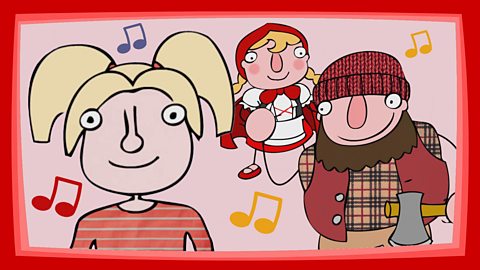The Wolf locks Grandma in the attic and then gets into bed - disguised in one of Grandma's nighties - to await Red Riding Hood.
The tutorial video
Tutorial 6: Learn the song 'What big eyes you've got!'

Song: 'What big eyes you've got!'
Encourage the children to listen carefully to the jumpy rhythm of the chorus and to sing it with lots of energy. Practise speaking the chorus slowly, before singing it, to make the words as clear as you can.
Practise the spoken section in Verse 3.
Practise the two-part section, at the end of Verse 3, when the Wolf snarls at Grandma and she screams.
Sing with the full-vocal version of 'What big eyes you've got!'
Sing with the backing track of 'What big eyes you've got!'

Part 6 of the story
Part 6 of the story
The Wolf peers out from the pantryÔÇŽbut Grandma is nowhere to be seen. He creeps upstairs to her bedroom and thinks he can see her under the bedclothes - but Grandma has tricked him! Then he hears a faint cough from above and realises Grandma is hiding in the attic.
Grandma is in a feisty mood but the Wolf says he intends to save her for later, so he locks her in the attic. Then he goes downstairs again and puts on one of Grandma's nighties, to disguise himself as her. He gets into bed, pulls the sheets up to his eyes, and waits for Red Riding Hood to come in.
She comes upstairs and approaches the bed, but there seems to be something wrong - Grandma doesn't sound like GrandmaÔÇŽor look like her! The Wolf rises from the bed and Red Riding Hood is frozen to the spot.
for the illustrated transcript of the story episode.

Literacy links
Reception / Year 1: Talk about what Red Riding Hood says to the Wolf: ÔÇśWhat big eyes youÔÇÖve gotÔÇŽÔÇÖ etc. Draw a picture of the Wolf in bed, dressed as Grandma. Pick one line from their conversation and write it as a caption.
Year 2: Talk about what may happen next in the story. What do the children think the ending might be? Ask them to think about who might come to help Red Riding Hood and Grandma and what could be done to get rid of the Wolf.

Music activity 6
Music activity
The focus is rhythm. Sarah Jane sings different notes, in an ascending and descending scale and the children copy. They lift their hands and lower them, to show the notes ascending and descending.
Later, in pairs, the children can work together to sing a short phrase of high notes, then a phrase of low notes. Then share and compare them with the rest of the class.
Tuned percussion instruments could be used instead of singing, if they are available.

An extract from 'The Arrival of the Queen of Sheba' from 'Solomon' by Handel (1748).
Listening music
The arrival of the Queen of Sheba from Solomon, by Handel (1748).
What is the mood of the music? What do children think it might be about?
The instruments playing the main melody are violins - part of the string family.
Is the tempo fast or slow? (Fast!)
There are some other instruments that come in later (at 28") called the clarinet and the oboe - woodwind instruments.

Comprehension quiz
Five questions about the story.

Resources
Download / print Teacher's Notes (pdf)
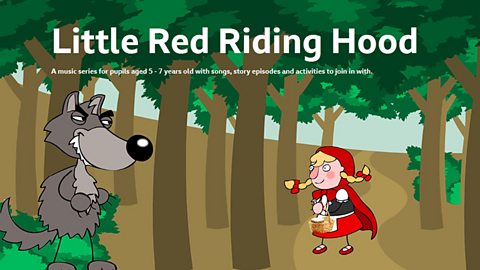
Download / print the music (pdf)
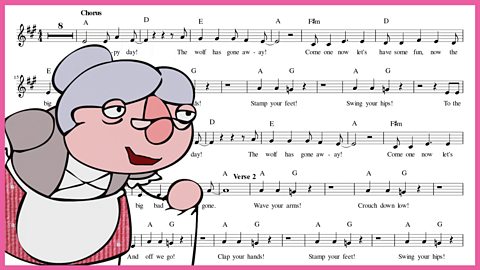
Download / print the lyrics (pdf)
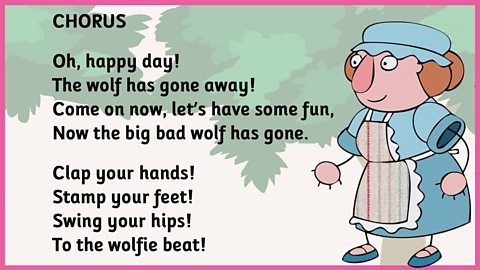
Vocal warm-up video
Sing the vocal warm-up (video)
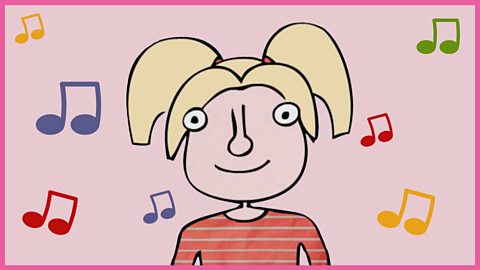
Meet the characters. image
A slideshow of images showing the characters in the story
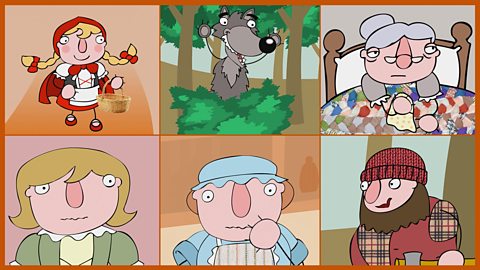
Download / print the story (pdf)
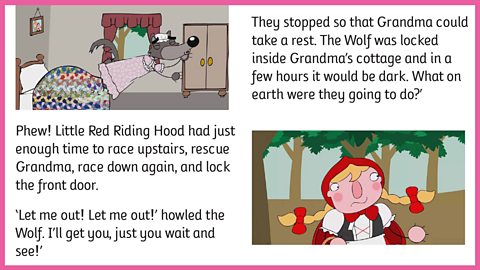

Watch next
4. Stay on the path. video
Ma warns Red Riding Hood to stay on the path but she is distracted by the woodland fairies. Then she feels a tap on her shoulder and turns to see a huge hairy creature in a straw hat. But who is it..?
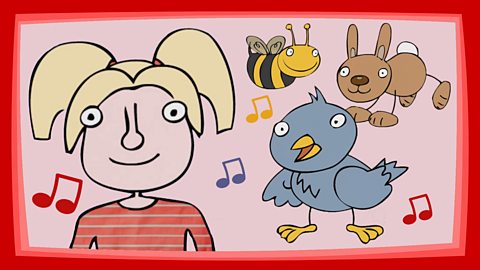
5. Wolfie went a-walking. video
The Wolf reaches Grandma's cottage before Red Riding Hood. Grandma spies his hairy paw through the letterbox and refuses to let him in. So the Wolf digs a tunnel under the cottage and into her pantry...
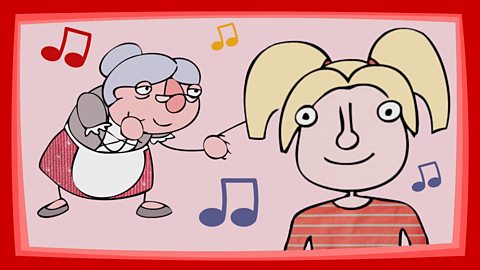
7. The big bad Wolf has gone. video
When Red Riding Hood arrives at Grandma's cottage the Wolf pounces but trips and misses her. Grandma and Red Riding Hood escape, locking the Wolf in the cottage. They are glad to hear the woodcutter has a plan...
